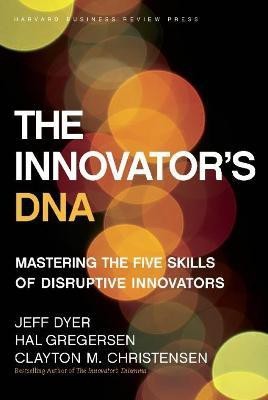The Innovator's DNA(English, Hardcover, Dyer Jeff)
Quick Overview
Product Price Comparison
This book explains how a person can cultivate habits that can make them a better innovator. Summary Of The Book The skills that lead to innovative visions and actions are in the genes. Some people are born with it, most people are not. If one does not have the skill naturally, it cannot be acquired. Well, the authors of this book beg to differ. They assert that innovation is the result of a set of habits and that anyone can become an innovator if they learn to cultivate these habits. From the leaders of Amazon and Apple to the people who set up Google, it is all a result of a set of processes. That idea seems to take all the magic out of the popular view about innovative people. It seems to dispel the aura of genius and inspiration that people associate with innovators. But the authors are not trying to deconstruct legends here, they are trying to teach their readers what made these people legends in the first place. In The Innovators DNA, the authors identify a set of behaviors common to all great innovators. They say that anyone who manages to cultivate these habits can become creative entrepreneurs and successful innovators. These habits and behaviors are association, observation, experimentation, questioning, and networking. Association helps connect seemingly disparate concepts. For instance, Steve Jobs took a course in calligraphy and this, it is said, led him to develop the graphic-centric Macs. Observation involves getting inspiration from mundane situations and occurrences. For instance, Scott Cook, the founder of Intuit got the idea to develop a user friendly accounts package, Quicken, after seeing his wife struggle with their finances and getting exasperated with the accounts package she had purchased. Experimentation involves being bold enough to try out new things. Jeff Bezos, the founder of Amazon, grew up in a farm where his grandfather always dealt with most kinds of problems himself. This instilled in him the philosophy, ŌĆ£If I am confronted with a challenge, I can figure out the solution.ŌĆØ This mindset helped him try out the then experimental idea of selling book over the Internet. Questioning is the constant thirst for new knowledge, curiosity, the need to know more about the world around us. It involves coming up with questions based on the situation, so that it will elicit new information, it does not involve having a prepared set of questions for all situations. Networking, in this instance, does not involve just building relationships, it involves soliciting different opinions and viewpoints. Serious innovators constantly seek out people who have different viewpoints than their own, and use these divergent perspectives to generate new ideas. The attributes that give rise to what the authors call ŌĆśdisruptive innovationŌĆÖ is a dissatisfaction with the status quo, an urge to change things, and the willingness to take risks. The authors, in this provocative yet practical guide, show how readers can become great innovators themselves if they cultivate the listed habits. About The Authors Jeff Dyer is Professor of Strategy at Marriott School, Brigham Young University. Other books by him are Every Waking Moment and Collaborative Advantage. His books focus on innovation and collaboration. Before BYU, he worked at the University of PennsylvaniaŌĆÖs Wharton School. He also has five years experience as a consultant and manager in the firm Bain & Company. He has won many teaching awards including the Excellence In Teaching Award from the University of Pennsylvania. Hal Gregersen is Professor of Leadership at INSEAD. Other books by him are It Starts With One: Changing Individuals Changes Organizations,┬Āand Global Explorers: The Next Generation of Leaders. His books deal with innovation and change in global organization. GregersenŌĆÖs specific interest is in how business leaders and other professionals come up with new, groundbreaking ideas. Before joining INSEAD, he taught at other leading institutions like the London Business School, Brigham Young University etc. Dr. Gregersen and his wife divide their time between Boston and Paris. Clayton M. Christensen is the Kim B. Clark Professor of Business Administration at the Harvard Business School. Other books by him include The Innovator's Solution: Creating And Sustaining Successful Growth, Seeing What's Next: Using The Theories Of Innovation To Predict Industry Change, and Disrupting Class: How Disruptive Innovation Will Change The Way The World Learns. His books discuss change and innovation. Clayton M. Christensen was born in 1952 at Salt Lake City, Utah. He holds a B.A. in Economics from Brigham Young University, an M.Phil from Oxford University, and an M.B.A. from Harvard Business School. He worked for the Boston Consulting Group before joining Harvard University. He has founded innovation consultancies and investment firms. He serves on the boards of Tata Consultancy Services, Franklin Covey, and Vanu, Inc. He lives in Belmont, Massachusetts, with his wife Christine. They have five children.


